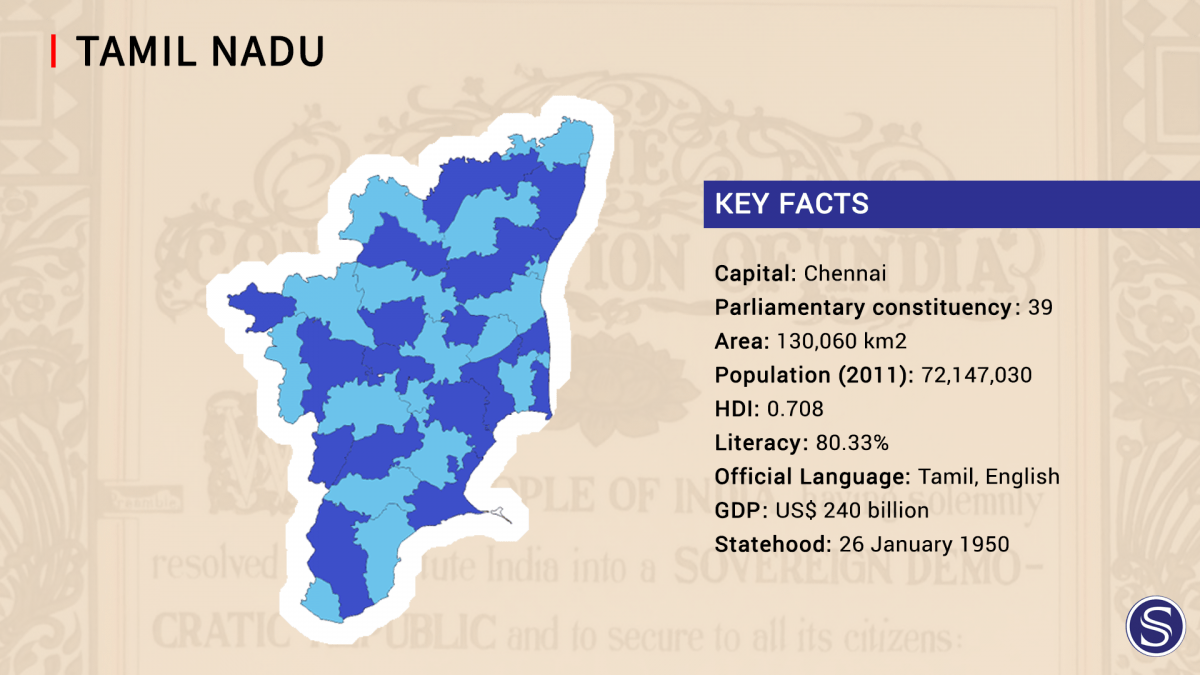Tamil Nadu is the economic powerhouse of South India, but it is also the leader in water and energy conservation while having the world's sixth largest solar power plant at Kamuthi. So what are the new challenges for the state?
Background
- The eleventh largest Indian state by area and the sixth largest by population.
- It has a high HDI ranking among Indian states as of 2017.
- The economy of Tamil Nadu is the second largest state economy in India with US$250 billion in gross domestic product and a per capita GDP of US$2,400.
- It was ranked as one of the top seven developed states in India based on a "Multidimensional Development Index" in a 2013 report published by the Reserve Bank of India.
- Its official language is Tamil, and it is one of the longest surviving classical languages in the world.

Analysis
When India became independent in 1947, Madras Presidency became Madras state, comprising present-day Tamil Nadu, coastal Andhra Pradesh up to Ganjam district in Odisha, South Canara district Karnataka, and parts of Kerala. The state was subsequently split up along linguistic lines. In 1969, Madras State was renamed Tamil Nadu, meaning "Tamil country".
The region was ruled by several empires, including the three great empires – Chola, Chera, and Pandyan empires, which shape the region's cuisine, culture, and architecture. The British Colonial rule during the modern period led to the emergence of Chennai, then known as Madras, as a world-class city. Modern-day Tamil Nadu was formed in 1956 after the reorganization of states on linguistic lines. The state is home to a number of historic buildings, multi-religious pilgrimage sites, hill stations and three World Heritage sites.
1) Water: the state suffers from acute water shortage and depends on the river Kaveri for most of its irrigation needs. The state has proposed the setting up of expensive desalination plants but the costs remain an area of concern. Water conservation and rainwater harvesting are already a mandatory requirement for buildings taller than three floors, but it does not save enough water for the state’s general use.
2) Energy: Tamil Nadu recorded a surplus amount of electricity generation in 2005-06 but less than a decade later, it was importing electricity due to stalled power projects and the delay in the controversial Kundankulam nuclear power plant. Fortunately, Tamil Nadu is blessed with ample sunlight all year-round and it is a suitable state for large-scale, solar power plants. In addition, these solar power plants can be combined with wind farms to save space and costs on the transmission of generated electricity.
3) Environment: Like any other political entity on the planet, Tamil Nadu is not immune to the negative impacts of climate change. The state enjoys a long coastline with fisheries and cement production being the largest industries in coastal areas. There have been instances of local coral reefs being destroyed for the large cement manufacturing industry, which has disrupted the marine ecosystem. Additionally, climate change is expected to make the summers harsher and potentially intensify the droughts in the state. Fortunately, the state and local governments in Tamil Nadu have deployed large scale water conservation, rainwater harvesting, energy conservation and renewable energy generation policies. Tamil Nadu is arguably the best-equipped state to lead the country’s green tech revolution.
Assessment
- Our assessment is that Tamil Nadu has overcome several hurdles which still plague other states, and it faces new, more complex challenges. We believe that that the state’s primary concern is still water and irrigation, and the only way to avoid a drought will be to employ a practical approach towards the water sharing agreement with its neighbouring states.
- We also feel that Tamil Nadu should use its existing policy framework regarding renewable energy and resource conservation as a launchpad for a large-scale overhaul of the state’s power generation and distribution system. We feel that it will be the first step in the process of incorporating eco-friendly measures in day-to-day life.
- The State must formulate an innovative policy to tackle its increasingly dire seasonal water shortages. We believe that desalination plants are too expensive but the formulation for a new ground water replenishment action plan could be a starting point for the government.

